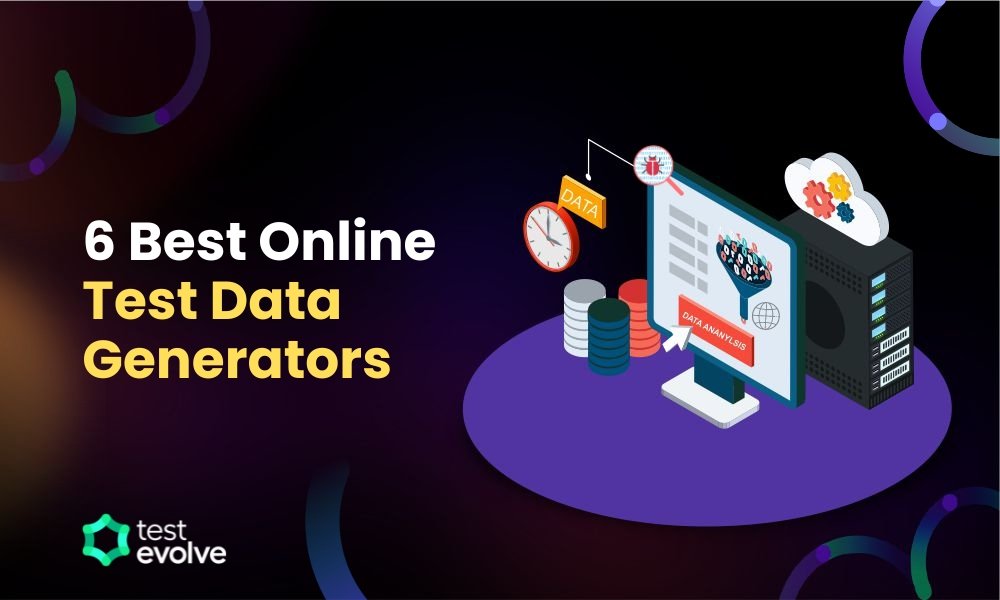6 Best Online Test Data Generator
As a software tester or developer, you know that precise and diverse test data is key to project success. With growing demands for privacy, security, and realism, the right test data generator is more essential than ever.
A test data generator is a tool that automatically or manually creates synthetic test data for software testing. This data can simulate real-world scenarios and help ensure that software performs as expected under different conditions.
Test data generators can be used for a variety of purposes, including evaluating software applications, improving ML/AI algorithms, training AI models, and populating databases with dummy data.
What is a Test Data Generator?
The term test data describes the scenarios, conditions, and input values that help confirm and validate the software's functionality, performance, and behaviour. For software testing, QA teams use these tests to define the specifications and boundaries for the data they need to generate.
Test data can vary in format, data types, ranges, and relationships among data elements. The process of test data generation involves creating artificial, realistic test data, either automatically or manually, for software that is still under development.
DevOps and testing teams use test data generation to simulate real-world scenarios and ensure that the software performs as expected across various environments.
Best Open Source and Online Test Data Generation Tools
Simplify your online test data generation process with these advanced online test data generators.
1. Mockaroo
Mockaroo is an online tool that allows you to quickly and simply download a significant amount of test data that is randomly generated based on your specifications. DevOps and QA teams can generate up to 1,000 rows of realistic test data in CSV, JSON, SQL, and Excel formats.
This web-based tool lets you generate realistic fake data for various purposes, like:
Testing software applications
Populating databases
Creating sample documents
Features
You can install Mockaroo in your personal cloud by using its Docker image.
Multiple mock libraries are available for almost every language and platform.
It saves time and effort compared to manually creating fake data.
Creates realistic data that helps simulate real-world scenarios during testing.
No coding is required; it is easy to use, even for non-programmers.
Pros
The platform is extremely easy to use; all users need to do is follow a few steps or procedures to generate test data.
A self-explanatory tool that allows anyone to use this tool without any training sessions.
A wide range of options are available to mock an API.
Get full access to the URLs, responses, and error conditions.
Cons
There are only 1,000 rows per file in the free version.
People who are unfamiliar with the concepts of data generation might require explanations regarding the tool.
2. Redgate SQL Test Data Generator
Redgate SQL Data Generator (SDG) is a tool that creates realistic, Pseudo test data for SQL Server databases. It can be used to generate data for specific columns and tables and can be used for a variety of purposes, including table and column names, field lengths, data types, and other existing constraints.
Features
The parameters of the tool can be customised to meet QA team requirements.
Large volumes of data can be created in SQL Server Management Studio with only a few clicks.
Over 60 built-in generator options are available with sensible configurations.
Set triggers and constraints to prevent changing database logic.
Pros
Fast-paced data generation.
Almost all versions of Microsoft SQL Server, including 2005, 2008, 2012 R2, 2014, 2016, 2017, and SQL Server on Amazon RDS, are supported.
Set limits for your data generation by utilising pre-defined rules.
Available support for inter-column dependencies.
Cons
It's more costly compared to other tools.
3. Randat
You can create an online table with random personal information, such as name, age, occupation, salary, and so on, using this free random data generator tool.
This data table can be used for data analysis, teaching, database testing, and Microsoft Excel advancement, among other things.
Just choose your desired columns and row count, then click the generate button. The generated table can also be exported as a CSV or MS Excel (.XLS and XLSX) file.
Features
It is easy to create table columns.
Surplus number of columns is available to generate the table.
The Randat software has surplus columns available for table generation.
Pros
It is very easy to create a dummy table for educational purposes.
No technical expertise is required to create the table.
Cons
You can not add specific age numbers, you only need to select age groups.
Not perfectly suited for e-commerce businesses.
Limited file formats are available.
4. Upscene – Advanced Data Generator
This advanced test data generator tool generates realistic test data for databases used in software applications. It includes libraries containing real-world-like data (names, addresses, etc.) for a more natural feel. It's a tool for developers to create test data that mimics real-world scenarios for thorough software testing.
Using the following steps, the Advanced Data Generator creates data directly within your database:
Creating Tables
Stored Procedures
Custom SQL statements (INSERT INTO, etc.)
Features
Can directly generate YAML, JSON, CSV, XML DataPacket, and SQL scripts.
The Advanced Data Generator can generate binary, large, date/time, character, and numeric data.
You can reuse particular data entries by using Templates for column/parameter settings that are supported.
Pros
Offers better support for non-English locales.
Special access editions for Firebird, MySQL, and InterBase.
Enhanced support for binary files.
It allows you to generate table data multiple times for the same project.
Cons
Data authenticity is a big challenge.
The trial version is limited
5. DatProf
Datprof is a test data generation tool that is designed to simplify and streamline the process of producing high-quality, representative test data, making it easier to understand and more efficient.
Its user-friendly interface empowers testers to generate diverse datasets that accurately reflect real-world scenarios, enhancing the effectiveness of software testing.
Features
This test data generator tool enables testers to define rules and constraints for data generation to ensure compliance with specific requirements and business logic.
Testers can generate diverse datasets quickly.
This tool can generate large volumes of data, which qualifies it for testing scenarios requiring broad data coverage.
Supports all the main database technologies.
Pros
A limited-time free trial is offered.
Allow you to customise the pricing model according to your feature requirements.
Save time in creating databases
Performs well over large datasets
Cons
Not suitable for complex data environments.
Masking rules can't be copied
6. Mostly AI
This AI test data generation tool uses machine learning technology to create realistic synthetic data.
Testers can generate diverse and representative test datasets that closely mimic real-world data while protecting sensitive information.
It uses advanced generative models to create fake data while preserving the statistical relationships and characteristics of the original dataset.
Features
This detailed data insights report gives you a 360-degree view of your synthetic data.
MOSTLY AI is compatible with almost all kinds of structured data, including numerical, categorical, and date-time variables.
This test data generator uses its own proprietary algorithms to create synthetic data with the highest accuracy.
Pros
Its intuitive web-based UI makes it easy for everyone to create high-quality and privacy-secure synthetic data.
Users can create synthetic datasets that act by adjusting variable distributions with the data rebalancing feature.
It creates a variety of datasets that are customised for particular use cases, accelerating development cycles.
Cons
You can access only 5 high-quality synthetic datasets in a day.
Not allow you to access other features in its trial version.
Summarizing
In conclusion, selecting the right test data generator is essential for ensuring your software performs reliably in real-world scenarios. With the tools outlined above, you can streamline your testing process, enhance data accuracy, and ultimately improve the variance of your testing.
Choose the tool that best fits your project’s needs and take your testing to the next level.
Need support with software testing? Connect Reach out to the Test Evolve team.


